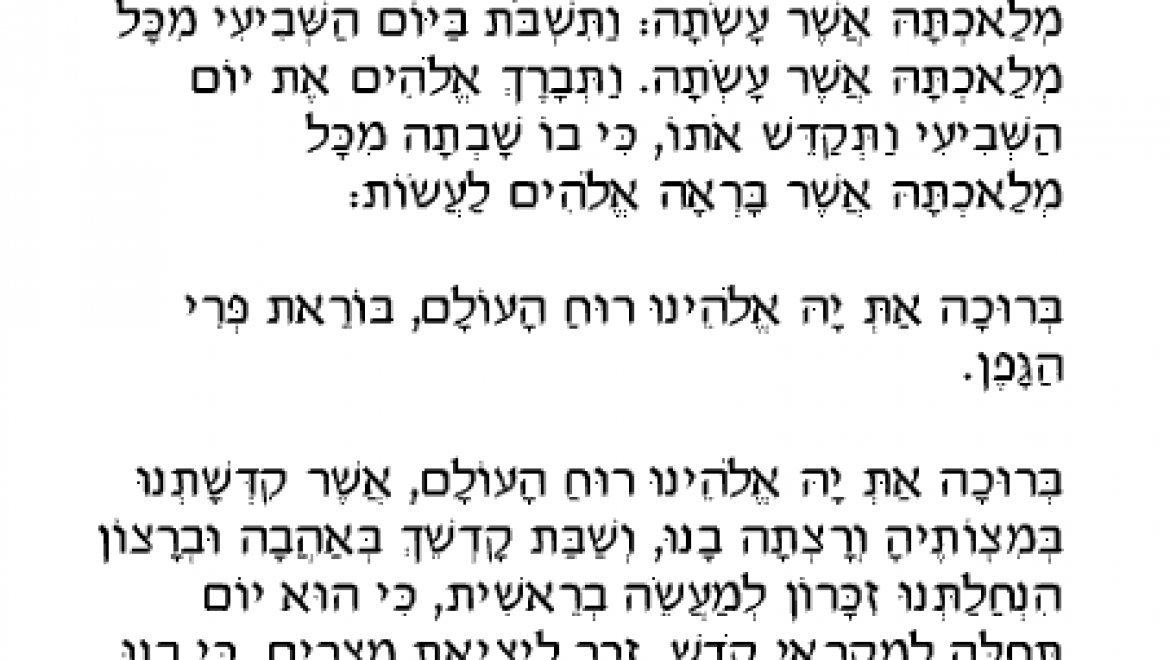
This article presents the Reconstructionist adaptation of Kiddush into feminine God-language, including a recording by Rabbi Margot Stein, a Reconstructionist rabbi, musician, cantor, and educator, the full text in Hebrew, English and transliteration, and an explanation of the meaning behind the textual variations. Traditionally, Jewish Hebrew liturgy refers to God using masculine language and verb conjugations. This version of Kiddush exemplifies the blending of modern cultural values of egalitarianism and feminism with traditional Jewish ritual. To see the adapted text alongside the traditional text with masculine God language, click here. This source comes from Ritualwell.org, a website which provides multimedia resources from the Reconstructionist Movement to enhance Jewish rituals..
Textual Variations
This recording of the Kiddush using feminine God language is recited by Rabbi Margot Stein, an active leader in the Reconstructionist movement, a teacher at the pluralistic Florence Melton Adult Mini-School for Jewish learning, and a cantor.
Hebrew
וַיְהִי עֶרֶב וַיְהִי בֹּקֶר יוֹם הַשִּׁשִּׁי וַיְכֻלוּ הַשָּׁמַיִם וְהָאָרֶץ וְכָל צְבָאָם וָתְכַל אֱלֹהִים בַּיּוֹם הַשְּׁבִיעִי מְלַאכְתָּהּ אֲשֶׁר עָשְׂתָה. וָתִּשְׁבֹּת בַּיּוֹם הַשְּׁבִיעִי מִכָּל מְלַאכְתָּהּ אֲשֶׁר עָשְׂתָה. וּתְבָרֵךְ אֱלֹהִים אֶת יוֹם הַשְּׁבִיעִי וָתְּקַדֵּשׁ אֹתוֹ, כִּי בוֹ שָׁבְתָה מִכָּל מְלַאכְתָּהּ אֲשֶׁר בָּרְאָה אֱלֹהִים לַעֲשׂוֹת.
בְּרוּכָה אַתְּ יָהּ אֱלֹהֵינוּ רוּחַ הָעוֹלָם בּוֹרֵאת פְּרִי הַגָפֶן
בְּרוּכָה אַתְּ יָהּ רוּחַ הָעוֹלָם אֲשֶׁר קִדַּשְׁתָּנוּ בְּמַצּוֹתֶיהָ וְרָצְתָה בָנוּ, וְשַׁבָּת קַדְּשָׁהּ בְּאַהֲבָה וּבְרָצוֹן הִנְחַלְתָּנוּ, זִכָּרוֹן לְמַעֲשֵׂה בְרֵאשִׁית. כִּי הוּא יוֹם תְּחִלָּה לְמִקְרָאֵי קֹדֶשׁ, זֵכֶר לִיצִיאַת מִצְרָיִם. כִּי בָנוּ בָחַרְתָּ וְאוֹתָנוּ קִדַּשְׁתָּ עִם כָּל הָעַמִּים, וְשַׁבָּת קָדְשְׁךָ בְּאַהֲבָה וּבְרָצוֹן הִנְחַלְתָּנוּ. בְּרוּכָה אַתְּ יָהּ מְקַדֶּשֶׁת הַשַּׁבָּת
Transliteration
Vay’hi erev vay’hi voker yom hashishi. Vay’chulu hashamayim v’hararetz v’cho tz’va-am. Vat’chal Elohim bayom hash’vi-I m’lachta asher asta. Vatishbot bayom hash’vi-I mikol m’lachta ahser asta. Vat’varech Elohim et yom hash’vi-I vat’kadesish oto, ki vo shavta mikol m’lachta asher bar’a Elohim la-asot.
B’rucha At Ya Eloheinu Ruach ha-Olam boreit p’ri hagafen.
B’rucha At Ya Eloheinu Ruach ha-Olam asher kid’shatnu b’mitzvoteiha v’ratzta vanu, v’shabat kodsheich b’ahava u’v’ratzon hinchalatnu zikaron l’ma’aseh v’reishit, ki hu yom t’chila l’mikra’ei kodesh zeicher litzi-at Mitzrayim, ki vanu vachart, v’otanu kidasht im kol ha’amim, v’shabat kodsheich b’ahava uv’ratzon hinchalatnu. B’rucha At Ya m’kadeshet haShabbat.
Translation
«And there was evening and there was morning: the sixth day. Heaven, earth, and all their beings were finished. God completed on the seventh day the work that had been done, and ceased upon the seventh day from all the work that had been done. God blessed the seventh day and set it apart. For on it God had ceased from all the work that had been done in carrying out the Creation.»
With the permission of this company:
Blessed are you, The Boundless One our God, the source of all life, who creates the fruit of the vine.
Blessed are you Yah our God, the source of al life, who has set us apart with your mitzvoth, and taken pleasure in us, and the holy Shabbat with love and favor made our possession, a remembrance of the work of Creation. For it is the first of all the holy days proclaimed, a symbol of the Exodus from Egypt. For you have called to us and make us holy for your service (some say: For you have chosen us from among all peoples) and given us to keep, in love and favor, your holy Shabbat.
Blessed are you, Source of Wonder, who sets apart Shabbat.
Explanation
In accordance with the Reconstructionist emphasis on fusing traditional Jewish rituals with modern liberal American cultural values, this variation of the traditional Friday night Kiddush replaces masculine references to God with feminine or gender neutral language, depending on the context. Additionally, God as “King of the world” has been replaced by “source of all life,” removing the concept of God as a masculine patriarchal ruler in a hierarchical social structure in favor of more gentle and natural language. The revised Kiddush also refers to the Jewish people as being called upon for holiness together with all other nations, moving the traditional particularistic language of a «Chosen People» to parentheses.
These textual variations are consistent with the original tenets of Reconstrcutionst Judaism, originally introduced into the Conservative movement by Mordechai Kaplan in the early 1920s. This movement promotes Judaism as a civilization that is constantly evolving in order to adapt to the surrounding changing culture, rather than a religion with a binding legal system. Reconstructionist Judaism emphasizes inclusivity, openness and equality, embracing intermarriage and same-sex marriage, and rejecting the idea of the Jews as a Chosen People.


